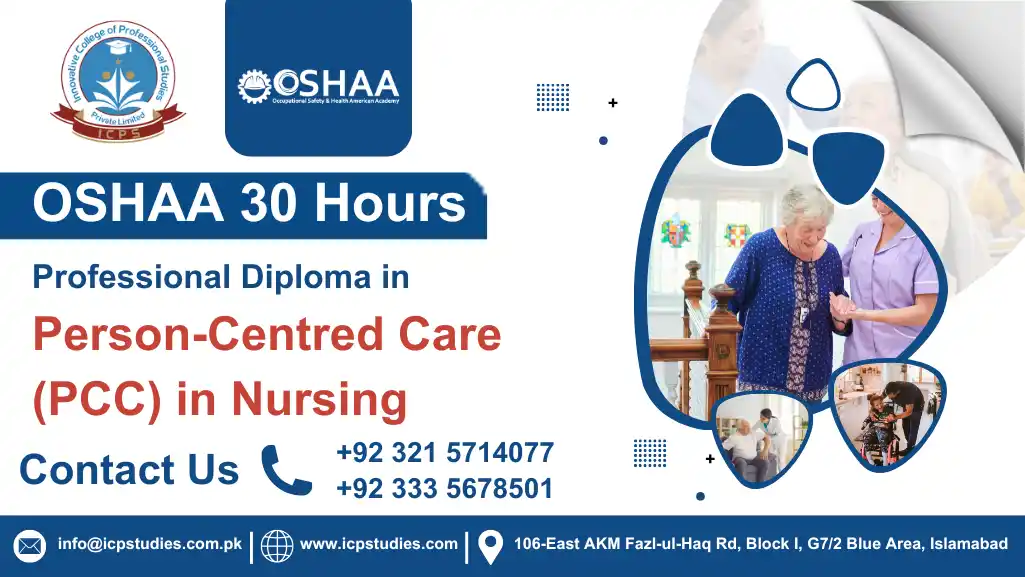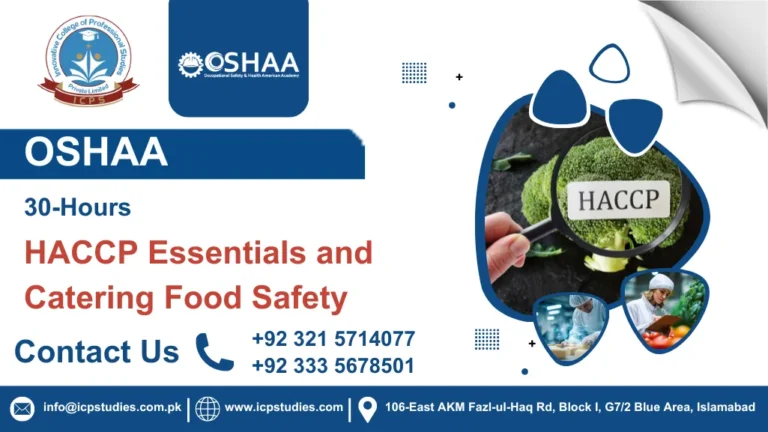The OSHAA 30-Hours Professional Diploma in Person-Centred Care (PCC) in Nursing is a specialised training programme designed for healthcare professionals who are committed to delivering compassionate, individualised care. This internationally recognised qualification places the person at the heart of all healthcare decisions and practices, ensuring dignity, respect, and holistic well-being in every care interaction. Person-Centred Care is a core value in modern nursing and healthcare systems across the world. This diploma provides participants with a structured, evidence-based framework to develop and enhance skills that foster empathy, partnership, and empowerment in care delivery.
The OSHAA 30-Hours Professional Diploma in Person-Centred Care (PCC) in Nursing is ideal for nurses and allied health professionals who aim to deepen their understanding of person-focused clinical practices and ethical responsibilities. By completing this OSHAA 30-Hours Professional Diploma in Person-Centred Care (PCC) in Nursing, participants will gain a comprehensive understanding of the principles and implementation of person-centred approaches across various healthcare settings, including hospitals, care homes, and community services. It aims to shift from a task-oriented mindset to a holistic, empathetic, and collaborative approach in healthcare delivery.
This OSHAA 30-Hours Professional Diploma in Person-Centred Care (PCC) in Nursing offers practical, real-world insights into transforming care delivery through empathy, respect, and clinical excellence. It enhances your ability to work in line with UK and international healthcare standards, increasing both patient satisfaction and professional competence. The diploma is delivered by industry experts with real-world experience in delivering person-centred care in clinical environments. This diploma sets the foundation for a transformative journey in healthcare, ensuring that every patient is treated not just as a case, but as a person with individual needs, values, and dignity.
All About OSHAA 30-Hours Professional Diploma in Person-Centred Care (PCC) in Nursing
Course Overview
The OSHAA 30-Hours Professional Diploma in Person-Centred Care (PCC) in Nursing is a comprehensive training programme that equips healthcare professionals with the skills needed to provide individualised, respectful, and empathetic care. Rooted in evidence-based practices, this course emphasises the importance of treating patients as partners in their own healthcare journey, ensuring that their values, preferences, and dignity are prioritised.
Designed in line with UK professional standards, the diploma explores key aspects of person-centred care, including compassionate communication, ethical nursing practices, cultural competence, and collaborative decision-making. Through a blend of theoretical knowledge and real-world applications, learners gain a strong foundation to improve patient outcomes and build trust-based relationships in clinical environments.
This OSHAA 30-Hours Professional Diploma in Person-Centred Care (PCC) in Nursing is ideal for nurses, care workers, and healthcare professionals working in hospitals, care homes, and community settings. It supports the development of soft skills and reflective practice, making participants more effective in both independent and team-based care delivery. The flexible structure makes it accessible to those balancing professional duties with personal development goals.
Study Units
- Introduction to Person-Centred Care
- Principles and Frameworks of Person-Centred Care
- Effective Communication in Person-Centred Care
- Cultural Competency and Sensitivity in Nursing
- Building Trust and Rapport with Patients
- Ethical Considerations in Person-Centred Care
- Patient Empowerment and Shared Decision-Making
- Assessing and Evaluating Patient Satisfaction and Outcomes
To ensure learners are prepared to fully benefit from the OSHAA 30-Hours Professional Diploma in Person-Centred Care (PCC) in Nursing, the following entry requirements must be met:
- Minimum Age: Learners must be at least 18 years old at the time of enrolment.
- Educational Background: A minimum of secondary education (Matriculation or equivalent) is recommended. A background in nursing, healthcare, or related fields will be advantageous.
- Work Experience: While not mandatory, prior experience in healthcare, social care, or support roles is beneficial for understanding practical applications.
- Language Proficiency: Learners should have a basic proficiency in English, including reading, writing, and speaking skills, to engage effectively with course content and assessments.
The OSHAA 30-Hours Professional Diploma in Person-Centred Care (PCC) in Nursing is designed for individuals who are passionate about delivering compassionate and individualised healthcare. It is ideally suited for:
- Registered nurses and nursing assistants seeking to enhance their patient-centred care skills
- Healthcare support workers and care assistants working in hospitals, care homes, or community settings
- Social care professionals aiming to integrate person-centred principles into their practice
- Nursing students and recent graduates looking to strengthen their professional profile
- Healthcare managers and team leaders responsible for implementing quality care standards
This course is also suitable for individuals transitioning into the healthcare sector who wish to develop a strong foundation in ethical, empathetic, and culturally responsive care.
Learning Outcomes
Introduction to Person-Centred Care
- Understand the fundamental concepts and philosophy of person-centred care
- Recognise the importance of individual needs, values, and preferences in nursing
- Identify the benefits of person-centred care for patients and healthcare providers
Principles and Frameworks of Person-Centred Care
- Explore key principles guiding person-centred approaches in nursing
- Examine internationally recognised frameworks and models
- Apply core values such as dignity, respect, and compassion in clinical practice
Effective Communication in Person-Centred Care
- Develop skills for clear, empathetic, and active communication
- Adapt communication styles to suit individual patient needs
- Enhance listening skills to better understand patient concerns and preferences
Cultural Competency and Sensitivity in Nursing
- Recognise cultural influences on health beliefs and care expectations
- Apply culturally sensitive practices in patient interactions
- Promote inclusivity and respect for diversity in healthcare environments
Building Trust and Rapport with Patients
- Learn strategies to establish meaningful, therapeutic relationships
- Foster trust through consistent, respectful, and honest communication
- Enhance patient comfort and cooperation through emotional intelligence
Ethical Considerations in Person-Centred Care
- Understand ethical principles relevant to nursing practice
- Identify and manage ethical dilemmas with professionalism and integrity
- Uphold patient rights, confidentiality, and informed consent
Patient Empowerment and Shared Decision-Making
- Encourage patient participation in care planning and choices
- Support autonomy and self-advocacy in health management
- Collaborate effectively to make decisions aligned with patient values
Assessing and Evaluating Patient Satisfaction and Outcomes
- Use appropriate tools and methods to measure patient satisfaction
- Analyse feedback to improve care quality and patient experience
- Implement changes based on evaluation outcomes for continuous improvement
FAQs OSHAA 30-Hours Professional Diploma in Person-Centred Care (PCC) in Nursing







